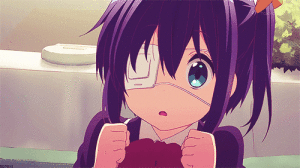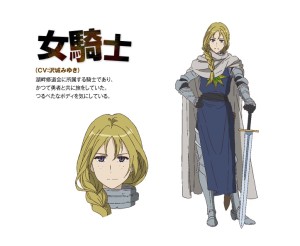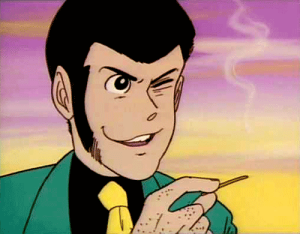Where Chuunibyou and Home Meet
by RadiumEyes, HSM guest contributor
Let’s talk for a moment about childhood. Specifically, I wish to look at juvenile fantasies that many children develop and eventually lose while growing up. To speak of this, I’ll invoke a term coined by the Japanese to describe this phenomenon – chūnibyō, or “junior high second year syndrome,” the focus of the 2011 light novel series Chūnibyō demo Koi ga Shitai!
Life for Takanashi Rikka was difficult – after her father’s death, her older sister became the surrogate parent while Rikka retreated into a little magical world of her own design. She never got over her father’s absence, and the Jaō Shingan (“True Eye of the Evil King”) became more appealing as a means of escaping the tribulations of losing a parent. Her older sister, Tōka (who only appears in the anime), sees Rikka’s reliance on this Wicked Eye as a hindrance, and sincerely wishes for Rikka to accept their father’s death and move on. However, Rikka opposes Tōka’s attempts to help her, and continues living in her fantasy world.
This all changes, however, thanks to Togashi Yūta. Yūta had gone through the same process that Rikka now lives through, but he dispensed with his “Dark Flame Master” identity fairly quickly; it became a source of great embarrassment for him, and he boxed up his costume, accessories and diary in an attempt to keep that identity in his past. However, his encounter with Rikka (who lives on the floor above him in an apartment complex) gradually erodes his own loathing of his former self; Rikka struggles to maintain her chūnibyō identity amidst her family, who sees her as a troublesome girl who only relies on her Wicked Eye fantasy because she doesn’t want to “see reality” and come to terms with life without a father.
 Now, a little history of the term chūnibyō. Hikaru Ijuin apparently first used this term (which is now derisive in implication) on the radio on 11 November 1999; the Internet picked up the term and ran with it. Chūnibyō as a social phenomenon refers to instances where people in secondary school suddenly exhibit traits and interests they hadn’t shown before, such as drinking coffee despite not particularly liking the taste. A “user manual” exists on the phenomenon, and it outlines three types: dokyun kei, those who act anti-social or delinquent despite not really qualifying as either; SubCul kei, the “hipster” persona that ignores mainstream tastes; and Jyakigan kei, the “Evil Eye” type that believes he/she has special powers, and creates an alias.
Now, a little history of the term chūnibyō. Hikaru Ijuin apparently first used this term (which is now derisive in implication) on the radio on 11 November 1999; the Internet picked up the term and ran with it. Chūnibyō as a social phenomenon refers to instances where people in secondary school suddenly exhibit traits and interests they hadn’t shown before, such as drinking coffee despite not particularly liking the taste. A “user manual” exists on the phenomenon, and it outlines three types: dokyun kei, those who act anti-social or delinquent despite not really qualifying as either; SubCul kei, the “hipster” persona that ignores mainstream tastes; and Jyakigan kei, the “Evil Eye” type that believes he/she has special powers, and creates an alias.
That third type, known as the “delusional type,” is the focus of Chūnibyō demo Koi ga Shitai. Rikka exemplifies this trope to a T; throughout the series, she must deal with her Wicked Eye “delusional” identity and the “reality” around her, where her father is deceased and her immediate family has a low opinion of her seemingly escapist behavior. As the show progress, we (as the audience) come to understand that Rikka structured her chūnibyō identity as a means of coping with a very traumatic event; she wants to avoid directly addressing it, and the Wicked Eye offers her an opportunity to live her life her own way.
By the series’ end, Yūta realizes that he prematurely dispensed with the Dark Flame Master, and he helps Rikka accept her father’s death while still maintaining her Wicked Eye as a means of coping with life as it comes. Central to Rikka’s acceptance is the Ethereal Horizon, a nebulous sphere where she believes her father to be. This region (Rikka’s own concoction) appears as a sort of transcendent, ethereal space represented by brilliant lights (similar to the Northern Lights), symbolizing the soul-searching that Rikka goes through in the series.
Establishing all this is necessary for my main topic – the nature of “reality” and how we approach it. SealWyf already wrote an exemplary article discussing this very subject, showing that reality has its own layers that define it. There’s a direct, observable reality independent of the observer, but also a more subjective one, composed of an individual’s collective experiences and separate offline and online identities. Who you are depends on spatial and temporal criteria – your Home self, your café frequenting self, your writer self, and so on. Each identity you develop (whether consciously or unconsciously) contributes to your overarching sense of self and how you relate to “reality.”
So, what about chūnibyō, that peculiar phenomenon where one suddenly develops a keen interest in something one showed no real knowledge or interest in before? It’s all part of this “reality” gig, and it’s a wonderful symbol of mutable identity. Much like other social platforms, Home gives you a means of creating your own little world, which you can inhabit and decorate; your world is connected to those made by others, a large collection of limitless potentialities that make it a microcosm of Earth, the solar system, the universe.
 Takanashi Rikka stumbled upon a way of dealing with the world around her that is simultaneously liberating and stifling – liberating in that she can play at her leisure and contextualize the world through the lens of her Wicked Eye (thus allowing her to deal with issues on her own personal level), stifling because she has great difficulty dealing with some of the more important issues at hand. It’s a delicate balance – Rikka must know when to be Rikka and when to be the possessor of the Wicked Eye, but the two can coexist peacefully.
Takanashi Rikka stumbled upon a way of dealing with the world around her that is simultaneously liberating and stifling – liberating in that she can play at her leisure and contextualize the world through the lens of her Wicked Eye (thus allowing her to deal with issues on her own personal level), stifling because she has great difficulty dealing with some of the more important issues at hand. It’s a delicate balance – Rikka must know when to be Rikka and when to be the possessor of the Wicked Eye, but the two can coexist peacefully.
For me, Home (and writing about Home) offers that transcendental experience of being “you” on various levels simultaneously. You can combine your varied identities into one space, showing off how you’ve evolved personality-wise. There’s an “essential you” driving everything, an immutable identity that is the combination of all these things, but each “alternative you” is an expression of that “essential you” – what defines “you” is complex yet beautiful, and you’re not limited to a single aspect of yourself.
I present myself as an example. My “anime fan” self has a deep fascination with Japanese culture and its animated output; it’s a dork, but a well-meaning and sociable dork. Then there’s my “depressed and introverted” self – that part of me who finds social interaction frightening and imposing, and prefers personal time and a more intimate setting. From there, I can identify my “fledgling writer” self (an apprentice wordsmith who enjoys writing for the sake of writing and sharing my experiences with the world) and numerous other “selves” that exist within my body.
All these various selves, in combination, make up my “essential self,” a product of my experiences and emotions. This “essential self” is very much the product of numerous identities acting in concert, but I feel that it is that immutable essence that makes me unique. I may appear sentimental, but characters like Takanashi Rikka show me that you’re not bound by any single facet of yourself – “yourself” refers to a multifaceted individual with so much to show, and when given the chance, “yourself” can thrive as that wonderful person you always want to be.
 Home is another facet of the Earth’s “self,” a reflection of a cosmopolitan human identity that never ceases to amaze. From the Hub (a central space that acts both as a social space and a connector to other spaces) to Cutthroats (a digital replication of the thrill of pirate ship combat), there are many worlds to discover and many people to meet.
Home is another facet of the Earth’s “self,” a reflection of a cosmopolitan human identity that never ceases to amaze. From the Hub (a central space that acts both as a social space and a connector to other spaces) to Cutthroats (a digital replication of the thrill of pirate ship combat), there are many worlds to discover and many people to meet.
Home is a window into a world where one can create your own fantasy. If you wish to be a pirate, commandeering your own vessel against other scurvy dogs, Cutthroats welcomes you. If you want to follow in Sen no Rikyū’s footsteps and host a tea ceremony, you have a personal space dedicated to it. You can continue your fantastic voyage into the unknown, and Home offers so much to accommodate.
Share
| Tweet |



 Twitter
Twitter
Actually MMOs have a very serious side when it comes to addiction as they are designed to get you addicted. a game has 8 to 100 hours play time gets shoved in its box and forgotten about or sold second hand. MMOs have no end time so 1000’s of hours are put into an MMO. this is achieved by task driven rewards, social responsibilities and the need to be all you can be. This can cause if unchecked depression when you havent got the ability to play your MMO, Anger if something stops you playing your MMO, Socially your virtual friends take priority over real life family and friends. You play too late and being late for real life responsibility. Even a lack of imagination because theres always something spectacular on your MMO. Remember MMOs are just a bunch of 1s and 0s and are littered with people that have had bad social relationships. You have to be so much more guarded against becoming addicted to a MMO or Relationships on a MMO. Because one day it might just get switched off or very good friends might say im off got something better in my life away from the MMO. Could all of us just get on with our lives if that happened, not so sure
Not to detract from your point, but the article deals with how you show yourself on any MMO, and not exactly with addiction. Being online means you can decide which parts of yourself to show (and in what order), making it a cousin perhaps to chuunibyou -- which can lead into addiction in some ways if you aren’t careful, granted. People who let themselves get wrapped up too much in an MMO can soon find themselves disregarding real life concerns, alienating people and worse.
However, RadiumEyes’ article highlighted a more generalized note: we are who we show on Home. At least that’s what I’m getting from it. Its scope isn’t to show the addicting nature of MMOs, or how that can cause problems. It’s to show that when we’re online we’re granted a greater sense of freedom in how we look to others. With digital avatars that are easier to manipulate, we can emphasize what we wish.
After all, Home allows you to be a Homeling, a sharp-dressed hamster, a mecha-musume or even a brain in a UFO. If that’s something relevant to your identity, why not take the opportunity?